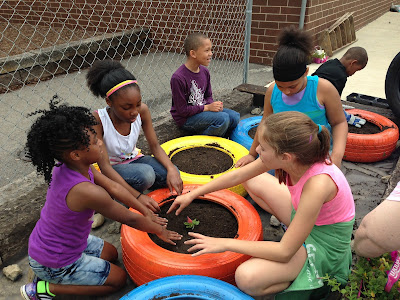In this lesson, students listen to a story and answer questions about a family in Central or South America that barters to get the ingredients for chicken sancocho, a kind of stew. The students complete sentences that record the various trades carried out by the family to obtain all of the ingredients for the sancocho.
They participate in a trading activity where they barter with each other to get the ingredients needed to make chicken sancocho and learn about the difficulties associated with barter. They use money in a second round of the trading activity to learn about money’s advantages over barter.
 |
| James and Angel practice bartering and trading for ingredients to make sancocho. |
During this interdisciplinary unit, students also enjoyed listening to podcasts of the novel Lemonade Wars by Jaqueline Davies. Listening to podcasts was chosen for this novel so that students could
work on their listening comprehension skills. Students were given a series of questions to complete as they listened to each chapter. This novel was a perfect choice to read as we explored economics because it detailed the story of Fourth-grader Evan Treski and is sister Jessie as they endeavored to become lemonade stand entrepreneurs. Evan is people-smart. He’s good at talking with people, even grownups. His younger sister, Jessie, on the other hand, is math-smart, but not especially good with people. So when the siblings’ lemonade stand war begins, there really is no telling who will win—or even if their fight will ever end. Brimming with savvy marketing tips for making money at any business, definitions of business terms, charts, diagrams, and even math problems, this fresh, funny, emotionally charged novel subtly explores how arguments can escalate beyond anyone’s intent.
In order for students to further grasp the concepts of economic principals, students were also able to play Money Metropolis, a free online game. Money Metropolis is an educational game hosted on Practical Money Skills. In the game students choose savings goals then navigate their way through a virtual town to earn money toward those goals. Some of the earning opportunities are more lucrative than others. And some earning opportunities are easier than others. As you might expect, the easier tasks are not as lucrative. Along the way they are presented with some opportunities to spend the money that they've earned, but spending at those opportunities sets students back on their progress toward their goals.
While students were busy reading and learning these important social studies topics, third graders were busy applying what they were learning to real life. In our classroom, students acted as producers by planting tomato, bell pepper, and marigold seeds and grew them in classroom greenhouses. Having learned about thermal energy, students were aware that these greenhouses created a perfect environment for our plants to grow and thrive.
 |
| Darren, Kaylin, and Angel work together to plant seeds. |
 |
| Classroom greenhouses provide thermal energy for plants to grow. |
Students observed the plants grow over the course of the next couple of months...



Finally, it was time to transplant the seedlings into pots.
 |
| Cayla displays her re-potted plant. |
 |
| Darren and Ray'Von and transplant seedlings. |
In the larger pots, students were able to watch the plants continue to grow and strengthen...


While reading Lemonade Wars, student's learned about how to determine prices for the good that they want to sell. They also learned that donating profits to a charity is something that some business people do. The third graders in room 177 agreed to hold a plant sale where each plant would be sold for $0.50 each. The proceeds from this sale would be donated to Alex's Lemonade Stand (for Childhood Cancer) Foundation,
On May 16th, students from Horizon Science Academy Dayton Elementary gathered at school for a spring planting event. Students worked together to plant a school garden. On this day, the third graders also held their plant sale.
 |
| Angel, Jayda, Cayla, and Diamond (not pictured) sold plants at the plant sale. |
When selling plants, the customers who purchase the product are the consumers.
 |
| Diamond helps a customer at the plant sale. |
While the plant sale was going on, students also helped beautify the school grounds...
 |
| Mr. Mims guides the students with planting day lilies. |
 |
| Jayda, Cayla, Angel and others help to plant the caterpillar garden. |
The third grade was able to raise a total of $25.00 to donate to Alex's Lemonade Stand. Through this project that was funded by a Kids in Need Foundation Grant that was awarded to Ms. Amstutz, students were able to experience first hand, the role of producers and consumers in a society and experience what it is like to work to manage a business. Students understood how much time it took to develop a product and they understood that sometimes, you have so spend money to be able to make money.


No comments:
Post a Comment